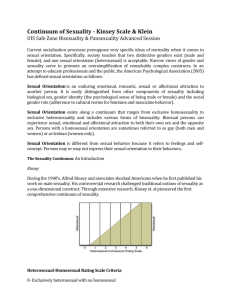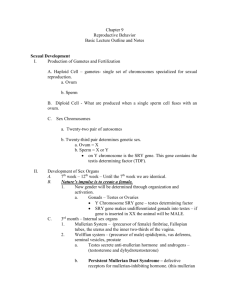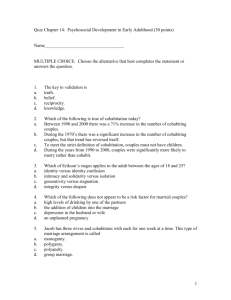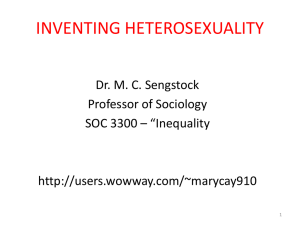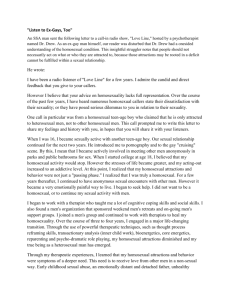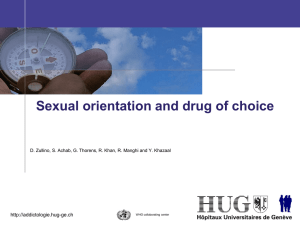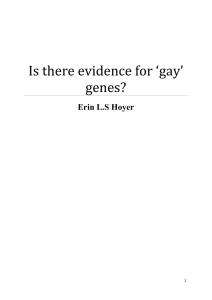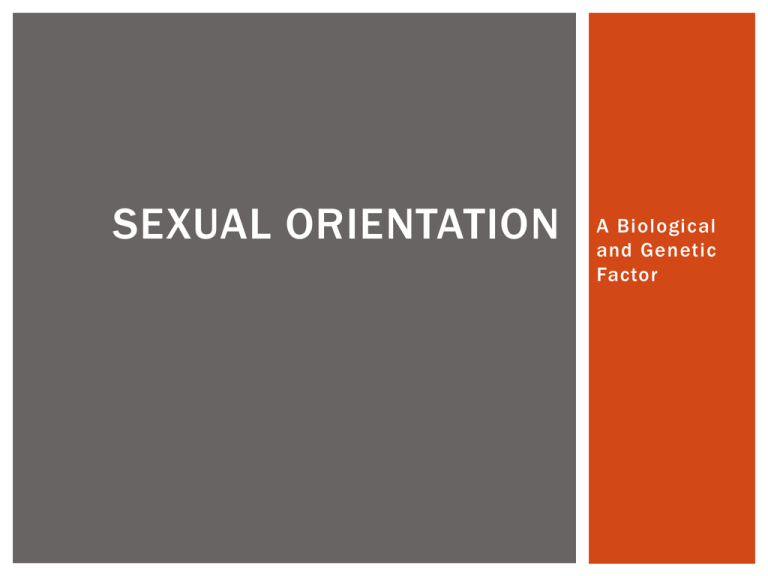
SEXUAL ORIENTATION
A Biological
and Genetic
Factor
WHAT IS SEXUAL ORIENTATION?
“Sexual orientation refers to an enduring pattern of emotional,
romantic, and/or sexual attractions to men, women, or both
sexes.”
Human sexuality is highly varied and contains many grey
areas.
•
•
•
•
•
•
Heterosexuality
Homosexuality
Bisexuality
Asexuality
Pansexuality
Demisexuality
http://www.apa.org/topics/sexuality/orientation.aspx
HISTORY
Human sexuality is a topic not of ten discussed openly. It wasn’t
until the late 1940s, when Alfred Kinsey revolutionized sexology,
there was proper research on the matter.
Kinsey developed The Kinsey Scale in an attempt to describe a
person’s sexual orientation .
0- Exclusively heterosexual with no homosexual
1- Predominantly heterosexual, only incidentally
homosexual
2- Predominantly heterosexual, but more than incidentally
homosexual
3- Equally heterosexual and homosexual
4- Predominantly homosexual, but more than incidentally
heterosexual
5- Predominantly homosexual, only incidentally
heterosexual
6- Exclusively homosexual
X- Asexual, nonsexual
http://www.kinseyinstitute.org/
WHY IS THIS AN ISSUE?
All around the world, people are failing to recognize that
sexual orientation is something that cannot be chosen, as it’s
genetic. Because of this thousands of people are victims of
hate crimes and discrimination from society, legal rights are
denied, and even medical concerns are raised.
Eliminating the ignorance that surrounds the issue can lead to
eliminating many of the societal issues.
A sample viewpoint
The more people who ignore the genetic predispositions, the
bigger the issues become.
RIGHTS
DENIED
H a te c r i m e s ,
d i s c r i mi n a t io n ,
and legal rights
are some
issues lack of
understanding
brings in
r e g a r ds to
s ex u al
o r i e n t a t io n .
http://thenewcivilrightsmovement.com/graphicstates-that-allow-marriage-between-first-
states-that-allow-same-sex-marriage-vscousins/news/2009/12/26/6464
THE SCIENCE (AND
TECHNOLOGY) BEHIND
SEXUAL ORIENTATION
Prenatal
hormones,
Brain
structure and
physiology,
and Genes
vs.
environment
PRENATAL HORMONES
Sex dif ferences begin to appear in fetuses beginning at about
seven weeks. Testosterone dif ferences between males and
females influencing sexual behavior begin.
Studies on individuals born with hormonal dif ferences such as
CAH (congenital adrenal hyperplasia).
“Masculine” hormones, “feminine” hormones may influence
sexual orientation.
Fraternal Birth Order Ef fect: the more older brothers an
individual has, the more likely a homosexual sexual
orientation (28-48%). Due to high production of testosterone
antibodies mother produces; each male fetus makes her more
“immune” to testosterone production.
Hines, 2010
BRAIN STRUCTURE AND PHYSIOLOGY
LeVay (1991) first studied dif ferences in the brains of
heterosexual and homosexual men and women. LeVay found
the Third Interstitial Nucleus of Anterior Hypothalamus (INAH 3) to be smaller in homosexual men which is a trait matching
heterosexual women.
“[the finding] indicates that INAH is dimorphic with sexual
orientation, at least in men, and suggests that sexual
orientation has a biological substrate .“
Corpus Callosum also dif fer in size between heterosexual and
homosexual men in general.
More recent studies using MRI technology show an
“anatomical mark” on the brains.
MRI scans indicate people attracted to women (HeM and HoW) had larger right
brain hemispheres, and those attracted to men (HoM and HeW) had more
symmetrical brains. Activity patterns in the amygdala (fight or flight response
center) are also shown.
DIGIT RATIO THEORY AND HANDEDNESS
2D:4D can indicate testosterone
and estrogen levels.
Longer ring fingers indicate more
testosterone, longer index fingers
indicate more estrogen. Ring and
index fingers of the same lengths
have a high correlation with
homosexual orientations (for both
men and women).
Men and women who are left
handed are also 50% more likely
to have a homosexual orientation.
Grimbos et al (2009)
GENES VS. ENVIRONMENT
Genetic marker Xq28 linked to homosexuality: similar traits
present on this marker in homosexual men tested against
heterosexual men.
Twin studies: twins raised apart are just as likely to share a
sexual orientation as those raised together
Biological and adoptive studies show biological links to sexual
orientation
Catch-22 of “nurture” debate: the more accepting a society is,
the more likely someone will be open about sexuality, however
society needs more exposure to become more accepting.
Sexual orientation in animals:
homosexual and bisexual behavior is
present in many animal species
suggesting a biological force applicable
to humans (particularly in non human
apes)
Nematode worms and mice with
manipulated brain chemistry have
shown changes in sexual orientation.
WHAT’S IN STORE?
The future
of the issue
and
conclusions
SOME GOOD NEWS!
The past few decades have made an enormous impact on genetic research.
Genetic mapping that used to cost millions of dollars now costs several
thousands.
The accessibility of such genetic
research can lead to further knowledge
of how sexual orientation is developed
and as the information becomes more
widespread, hopefully the ignorance
that causes the bulk of the issue will be
resolved.
Understanding human sexuality has come a long way, but
there are still limitations and issues in the matter.
Fortunately, we have the scientific and technological support
for this issue in general which can hopefully lead to wider
acceptance, until then however, it’s up to society to help
resolve these issues.
COURTNEY BECHTEL
November 1 ,
2011 .

